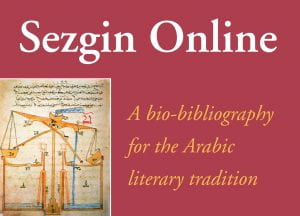 Sezgin Online : A bio-bibliography for the Arabic literary tradition – Sezgin Online consists of volumes 1-9 of Fuat Sezgin’s renowned Geschichte des arabischen Schrifttums (GAS), the largest and most modern bio-bibliography for the Arabic literary tradition in general and the history of science and technology in the Islamic world in particular.
Sezgin Online : A bio-bibliography for the Arabic literary tradition – Sezgin Online consists of volumes 1-9 of Fuat Sezgin’s renowned Geschichte des arabischen Schrifttums (GAS), the largest and most modern bio-bibliography for the Arabic literary tradition in general and the history of science and technology in the Islamic world in particular.
Sezgin Online offers bio-bibliographical information about renowned figures (writers, poets, philosophers, physicians, scientists, linguists etc.) from the Islamic world. Complementing Brockelmann Online and Brockelmann in English, it is an indispensable research tool for Middle East and Islamic studies. Features and Benefits
• Standard reference in the field.
• Largest and most modern bio-bibliography for the Arabic literary tradition and the history of science and technology in the Islamic world.
• The first and only online version of this standard reference.
• Includes content from 9 of the original volumes (4,959 pages total in print).
• Full-text searchable. Continue reading Recent Noteworthy Acquisition




